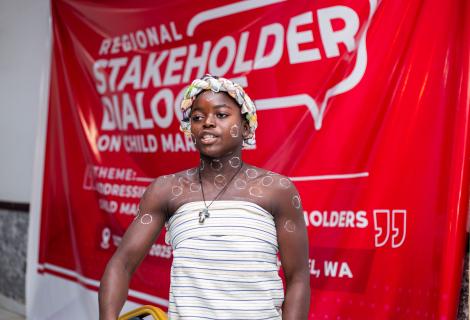Addressing Child Marriage in Ghana; ActionAid Ghana leads efforts for Stakeholder Commitment to Justice, Equality, and Development

Across the sweeping landscapes of Ghana’s Upper West Region and the rural heartlands of our country, a silent emergency continues to threaten the lives and futures of girls—child marriage. Despite the progress made through policy reforms, grassroots advocacy, and growing public awareness, far too many girls are still being forced into marriage, their rights violated, and their potential stifled.
This is not just a women’s issue. It is a national crisis. It is a developmental emergency. And it is a social justice imperative.
The Stark Reality in Ghana
The scope of the problem is both national and deeply regional. According to the 2021 Multiple Indicator Cluster Survey (MICS), Ghana’s national child marriage rate is approximately 19%, meaning nearly 1 in 5 girls is married before the age of 18. But national averages conceal deeper disparities—the Upper West, Upper East, Northern, and Savannah Regions bear the heaviest burden of this harmful practice, perpetuated by poverty, gender inequality, harmful traditional norms, and inadequate access to education and health services.
In 2024, the Ghana Health Service in Wa released troubling data: 14,221 girls aged 10 to 19 became teenage mothers between January and July alone. This isn’t just an indicator of early sexual activity—it reflects deeper systemic neglect and social tolerance of practices that normalize child marriage.
In Sissala District, ActionAid Ghana’s partner Asudev, supported by our Community-Based Anti-Violence Teams (COMBATs), recorded 32 cases of abduction and elopement in 2024. Thankfully, 14 girls were rescued and are currently receiving reintegration support in communities of their choosing. But countless others remain trapped—forgotten by systems meant to protect them.
A National Response: The Upper West Regional Conference
In response, ActionAid Ghana hosted the second Upper West Regional Stakeholders Conference in 2025, under the theme: “Ending Child Marriage: The Role of Stakeholders.” This landmark gathering brought together traditional leaders, youth advocates, government officials, survivors, civil society, and local authorities to assess progress, identify persistent barriers, and renew our shared commitment to end child marriage in Ghana.
“Ending child marriage is not an event; it is a process—a process that requires consistency, accountability, and bold collaboration. We must transform systems, not merely scratch the surface. We must amplify survivor voices, not just focus on statistics. And above all, we must be relentless in our pursuit of justice for every girl. This fight is not solely for the girl child. It is a fight for our communities, our development goals, and our shared humanity. Every girl we empower becomes a force for change.”
— John Nkaw, Country Director, ActionAid Ghana
Strategic Interventions and Our Commitments
In 2023, ActionAid Ghana and its partners made bold and actionable commitments that remain the foundation of our interventions:
- Scaling up community sensitization through partnerships with traditional authorities, queen mothers (Magazias), youth leaders, male champions, and assembly members.
- Promoting survivor-led storytelling, mentorship, and advocacy to humanize the issue and break the culture of silence.
- Pushing for stronger enforcement of district-level by-laws and demanding accountability and prosecution where laws are flouted.
- Promoting culturally sensitive dialogues to challenge norms while preserving communal harmony.
Through these actions, we are shifting the narrative—from silence to visibility, from stigma to strength, from victimhood to agency.
Progress Through Partnership
For over 35 years, ActionAid Ghana has worked hand-in-hand with communities to challenge and change the structural and cultural drivers of injustice. Our impact is made possible through shared action, shared commitment, and shared vision.
Key pillars of our child protection work include:
- COMBATs: Community-based teams trained to prevent violence and provide early warning and response.
- Young Female Platforms and Girls’ Clubs: Youth-led advocacy movements that amplify the voices of girls in schools and communities.
- ABCs of Reproductive Health Booklet: A practical, youth-friendly resource to promote bodily autonomy and health literacy.
- Child Marriage Survivor Experience Series: Powerful, real-life testimonies that serve to educate, challenge stigma, and inform policy.
- National-level policy engagement: Driving budgetary and strategic alignment between girls’ rights and development goals.
Despite these efforts, we recognize that the fight is far from over. The scale and persistence of child marriage in Ghana demand urgency, innovation, and systemic transformation.
Reflection, Interrogation, and Action
This year’s forum in Wa is not symbolic—it is strategic. It provides an opportunity to reflect on what has worked, interrogate what hasn’t, and renew our commitment with honesty and urgency. We must:
- Assess impact not only through numbers, but through lives transformed and communities empowered.
- Share lessons—failures as well as successes—to build a more resilient and responsive movement.
- Identify gaps in implementation and invest in collective problem-solving.
- Translate dialogue into durable action at both regional and national levels.
A Call to Collective Resolve
Ghana’s adolescent population constitutes over 22% of the country’s 31 million people. We cannot talk about national development without talking about girls. We cannot build the future while destroying the dreams of those who will inherit it.
We therefore call on:
- Government: Fully implement the National Strategic Framework on Ending Child Marriage (2017–2026) and increase budget allocations to adolescent health and protection.
- District Assemblies: Enforce and operationalize by-laws to prevent child marriage and prosecute perpetrators.
- Religious and Traditional Leaders: Take bold, public stands against harmful practices.
- Donors and Development Partners: Prioritize sustainable funding for community-led, rights-based solutions.
- Civil Society and Media: Sustain the pressure. Tell the stories. Demand change.
Together we can give every girl a dignified life.
-End-
Written by Jacqueline Parditey